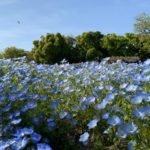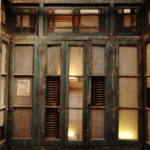
Bokanté impressed with their recent debut release, Strange Circles. The album introduced a group of musicians from five countries across four continents. Assembled by Michael League, the band explores roots music from around the world. League writes the music, sings, and plays oud, cümbüş, bass, guitar, Minimoog and percussion. He is joined by Bob Lanzetti and Chris McQueen on guitar and vocals, Roosevelt Collier on dobro and vocals, André Ferrari and Keita Ogawa on a wide variety of percussion, and Weedie Braimah on djembe and vocals. Malika Tirolien’s rich vocals and lyrics are the centerpiece of the ensemble.
What Heat, the band’s second release, raises the stakes by joining forces with Metropole Orkest for a fascinating project. The Metropole Orkest are a dynamic non-classical orchestra based in the Netherlands that are capable of enhancing any piece of music. Conducted by Jules Buckley, they add a great deal of power and emotion to the recording. The compelling arrangements, penned by League and Buckley, build a stage for Malika Tirolien to shine and make What Heat a deep listening experience.
The cover of the album features an image of a man sitting complacently while flames engulf him and his surroundings. This artwork represents the current passive state of humanity while chaos rages on across the world. The clever, inspired lyrics, sung in Tirolien’s native Guadeloupean Creole, do not shy away from addressing the issues that impact the lives of the band members. English translations are included in the liner notes.
While Strange Circles featured electric guitars, What Heat focuses on acoustic instruments and their harmonious strength. This capacity is instantly felt on the opening track, “All the Way Home.” A lone oud leads to an ominous drone from the Metropole Orkest that suggests this is no ordinary orchestra. Heavy percussion drives the ensemble while Tirolien sings about leaders who don’t listen to the people they serve. The lyrics call for them to leave, to go home and abandon their posts. It grandly sets the album in motion and captures the intriguing balance of darkness and light that is explored in each composition.
“Fanm (The Woman)” jumps into a swinging groove led by the oud and Tirolien’s enthusiastic vocals praising women and their strength. Metropole Orkest sweeps in with some moving flourishes. The Turkish daf adds depth to the percussive arrangement. Even the guitars pop, adding to the beat. A nice dobro solo closes the piece.
“Lè An Gadé-w En Zyé (When I Look in Your Eyes)” moves mysteriously thanks to some great work by Metropole Orkest. The arrangement conveys the feeling of trepidation described in the lyrics. The song reflects on a lover and how things have changed before realizing the love has dissolved. Lush strings add sustain before shifting to funky pizzicato plucks during a full ensemble passage. Tirolien and the orchestra become one on this memorable track.
The momentum rises quickly again for “Réparasyons (Reparations).” The strings and horns charge through this arrangement as Tirolien calls for paying out reparations while borrowing a gwo-ka rhythm from Guadeloupe and altering it by adding a sequence of chord changes. Her voice rises above the ensemble which features a wild guitar solo and a powerful percussion solo while the orchestra swells for a final arresting verse and chorus.
Settling back down, “Bòd Lanmè Pa Lwen (The Beach is Not Far)” finds Tirlolien singing about a long, arduous journey through the desert to reach an oasis. The lyrics praise those who push forward regardless of the struggle. The slow opening abruptly changes gears and thrusts into a fast section with heavy Moroccan-style percussion. Metropole Orkest match Tirolien’s dynamic phrasing perfectly, moving with grace.
A strong West African feel surrounds “Don’t Do It,” from the popping guitars to the strong use of the djembe. This track addresses the bad leaders around the world and the vocals call for their removal at once. The band slides through a slinky groove with great accents from Metropole Orkest especially on the outro.
“Chambre à Échos (Echo Chamber)” drifts in like a fog. Tirolien’s hushed vocals warn of living in an echo chamber where one only hears yes and doesn’t encounter different opinions. An element of darkness washes over this intriguing arrangement. Metropole Orkest demonstrate why they are so adaptable, adding subtle touches and magnificent cinematic surges at a moment’s notice. Tirolien slips her vocals effortlessly into the groove. Her beautiful improvisations soar with a hopeful twist in the arrangement.
The album closes with the ferocity of “Maison En Feu (House on Fire).” The song describes the setting of the cover art, a man burning while sitting motionless. This blues stomper chugs along with muscle as Metropole Orkest fills the spaces with precision. Tirolien shines on this track, her voice direct and fierce at times. She sings about extinguishing the fire that burns out of control with an endless stream of love. This notion of love conquering hate sums up the record and fits the closing track well.
Bokanté and Metropole Orkest capture a musical tension from start to finish that keeps the listener on the edge of their seat. This union goes beyond a simple collaboration. Both groups work in tandem to create something larger than themselves. What Heat is a striking record that gets better with each listen, each journey into a captivating world created by Bokanté and Metropole Orkest
Originally published in RootsWorld Magazine.




Be First to Comment